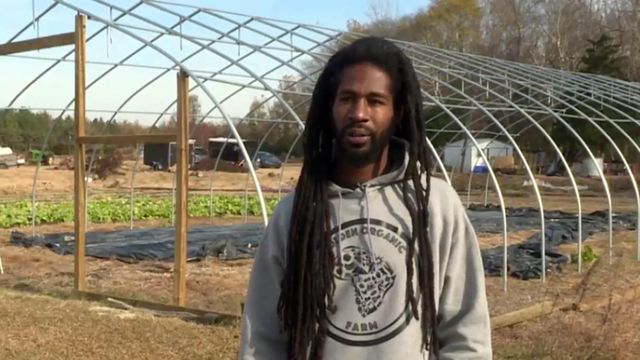Black farming incubator looks to bring racial equity back to agriculture in eastern NC
Black farmers have lost 90 percent of their land in the U.S. over the past century, according to a report from Modern Farmer magazine, so a farm in Edgecombe County is trying to bring racial equity back to agriculture in rural North Carolina.
Posted — UpdatedGolden Organic Farm has created an incubator to help aspiring Black farmers learn about agriculture.
"We are familiar with our past and the history that we all went through, but we’re more focused now on what we can create," Kendrick Ransome, the owner of Golden Organic Farm said Thursday.
A 2020 report from the National Young Farmers Coalition found that 98 percent of all U.S. farmland belongs to white landowners.
Ransome's farm near Pinetops has been in his family for more than a century, but during that time, most other black farmers haven’t been able to hold on to their land.
“There was quite a bit of struggle,” he said, “dealing with white supremacy and other kind of systematic racisms that were created to keep farmers out and to push farmers away from the land.”
Black farmers faced higher prices for seed, feed and fertilizer, for example, that drove many of them from agriculture, he said, creating a lack of resources that still exist.
“Just hearing about a lot of the traumas that our ancestors went through, you know, that’s what constantly pushes me to continue,” Ransome said.
Golden Organic now offers farming workshops, equipment sharing programs and even a community produce box using fruits and vegetables young farmers have grown.
"I understand how, a lot of the risk that comes with it, you know, a lot of the determination that you have to have in order to make it work. So, we teach that here – to strive and to continue to be the best that you can at it, although you’re lacking resources," he said. "Farming, it’s nothing easy about farming. So, we’re just here to find the resources [and] to bring the resources to our community and share it with them."
A full-time farmer for the past two years, Ransome said he hopes to transition completely from farming to teaching by 2023.
“Five years from now, if our farmers and gardeners have the equipment that they need [and] the infrastructure that they need, that’ll help us to be able to compete and to sustain our families for the next five to 500 years,” he said.
Related Topics
• Credits
Copyright 2024 by Capitol Broadcasting Company. All rights reserved. This material may not be published, broadcast, rewritten or redistributed.






